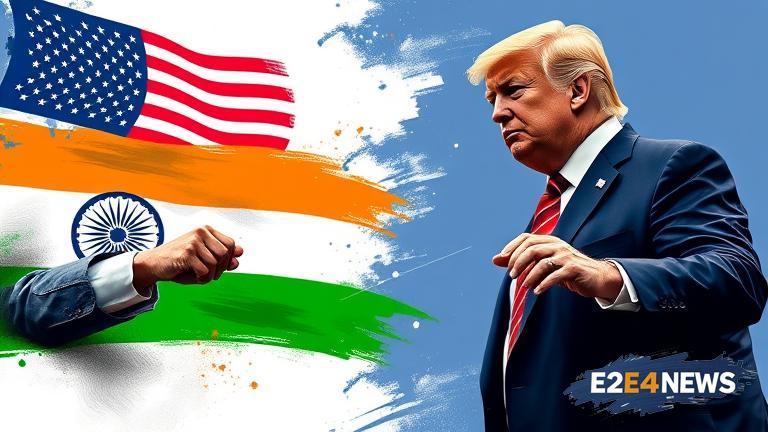The United States and India are on the brink of a trade war as President Trump has once again threatened to impose harsh tariffs on Indian goods. The reason behind this threat is India’s decision to continue purchasing oil from Russia, despite the US sanctions on Russian energy exports. Trump has been vocal about his disapproval of India’s actions, stating that the country’s decision to buy oil from Russia is unacceptable. The US has been trying to isolate Russia economically, and India’s actions are seen as a hindrance to this effort. India, however, has maintained that it will continue to purchase oil from Russia, citing its energy needs and the fact that it has already made significant investments in Russian energy infrastructure. The US has been pressuring India to reduce its dependence on Russian oil, but India has refused to comply. As a result, Trump has threatened to impose tariffs on Indian goods, including textiles, pharmaceuticals, and steel. The tariffs are expected to have a significant impact on India’s economy, and could lead to a trade war between the two countries. The US is one of India’s largest trading partners, and any disruption to trade between the two countries could have far-reaching consequences. India has already imposed tariffs on US goods, including almonds and apples, in retaliation to the US tariffs on Indian steel and aluminum. The trade tensions between the US and India have been escalating over the past few months, with both countries imposing tariffs on each other’s goods. The US has also been critical of India’s trade policies, including its high tariffs on US goods and its restrictions on foreign investment. India has maintained that its trade policies are designed to protect its domestic industries and promote economic growth. The trade war between the US and India could have significant implications for the global economy, and could lead to a decline in trade between the two countries. The US is also concerned about India’s growing trade relationship with China, and has been trying to persuade India to reduce its dependence on Chinese goods. India, however, has maintained that it will continue to engage in trade with China, citing its economic interests. The trade tensions between the US and India are also expected to have an impact on the global energy market, as India is one of the largest consumers of energy in the world. The US has been trying to promote its own energy exports, including liquefied natural gas, to India, but India has been reluctant to commit to large-scale purchases. The trade war between the US and India could also have significant implications for the global political landscape, as both countries are major players in international affairs. The US has been trying to build a coalition of countries to counter China’s growing influence in the region, and India is seen as a key partner in this effort. However, the trade tensions between the US and India could undermine this effort, and could lead to a decline in cooperation between the two countries. The Indian government has maintained that it will continue to engage in trade with the US, but will also protect its domestic industries and promote economic growth. The US, on the other hand, has maintained that it will continue to pressure India to reduce its dependence on Russian oil and comply with US sanctions. The trade war between the US and India is expected to continue, with both countries imposing tariffs on each other’s goods and engaging in a war of words over trade policies. The outcome of this trade war is uncertain, but it is clear that it will have significant implications for the global economy and the political landscape.
